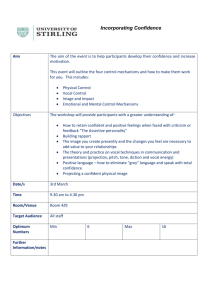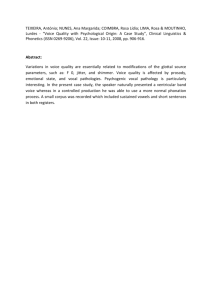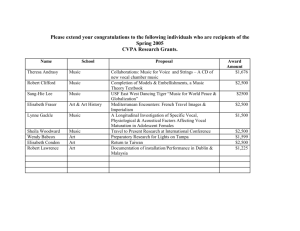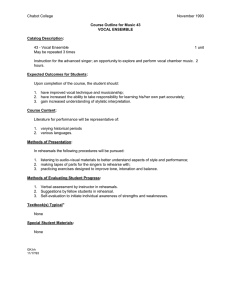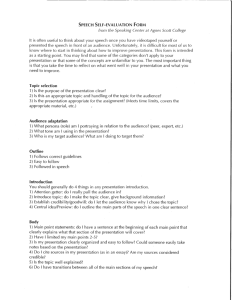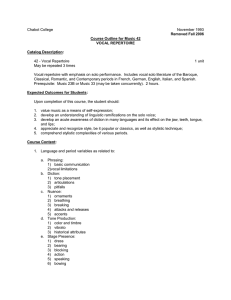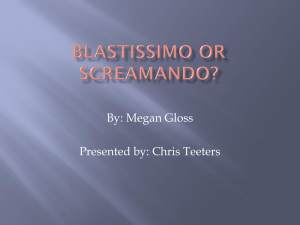Baton Rouge Community College Academic Affairs Master Syllabus
advertisement
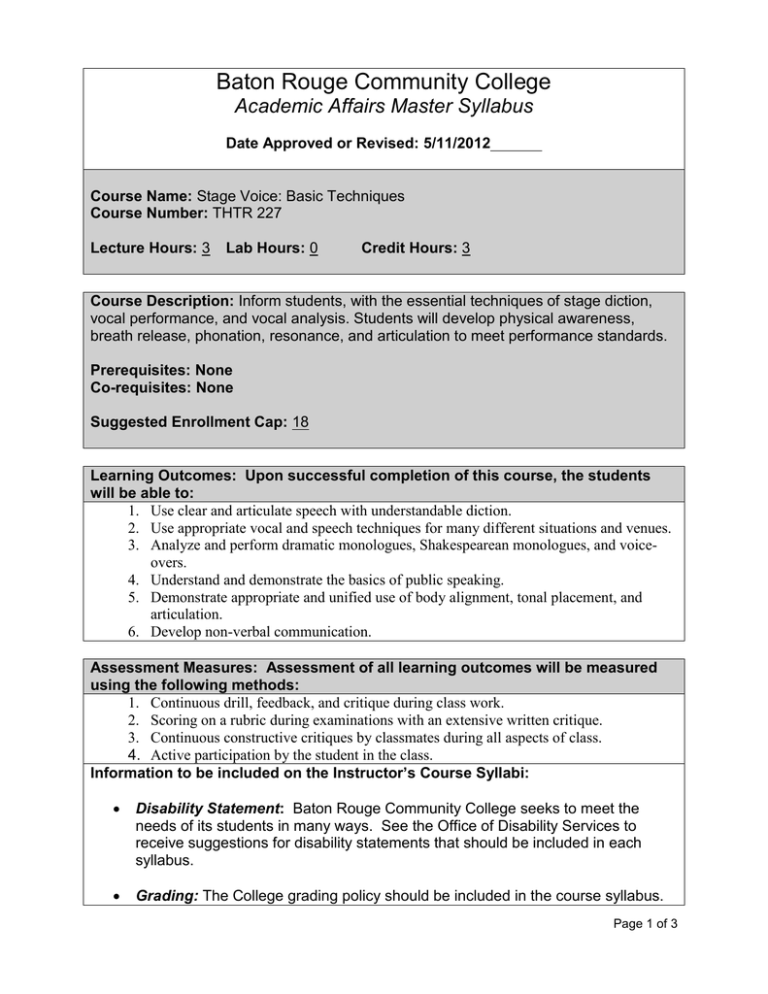
Baton Rouge Community College Academic Affairs Master Syllabus Date Approved or Revised: 5/11/2012 Course Name: Stage Voice: Basic Techniques Course Number: THTR 227 Lecture Hours: 3 Lab Hours: 0 Credit Hours: 3 Course Description: Inform students, with the essential techniques of stage diction, vocal performance, and vocal analysis. Students will develop physical awareness, breath release, phonation, resonance, and articulation to meet performance standards. Prerequisites: None Co-requisites: None Suggested Enrollment Cap: 18 Learning Outcomes: Upon successful completion of this course, the students will be able to: 1. Use clear and articulate speech with understandable diction. 2. Use appropriate vocal and speech techniques for many different situations and venues. 3. Analyze and perform dramatic monologues, Shakespearean monologues, and voiceovers. 4. Understand and demonstrate the basics of public speaking. 5. Demonstrate appropriate and unified use of body alignment, tonal placement, and articulation. 6. Develop non-verbal communication. Assessment Measures: Assessment of all learning outcomes will be measured using the following methods: 1. Continuous drill, feedback, and critique during class work. 2. Scoring on a rubric during examinations with an extensive written critique. 3. Continuous constructive critiques by classmates during all aspects of class. 4. Active participation by the student in the class. Information to be included on the Instructor’s Course Syllabi: Disability Statement: Baton Rouge Community College seeks to meet the needs of its students in many ways. See the Office of Disability Services to receive suggestions for disability statements that should be included in each syllabus. Grading: The College grading policy should be included in the course syllabus. Page 1 of 3 Any special practices should also go here. This should include the instructor’s and/or the department’s policy for make-up work. For example in a speech course, “Speeches not given on due date will receive no grade higher than a sixty” or “Make-up work will not be accepted after the last day of class.” Attendance Policy: Include the overall attendance policy of the college. Instructors may want to add additional information in individual syllabi to meet the needs of their courses. General Policies: Instructors’ policy on the use of things such as beepers and cell phones and/or hand held programmable calculators should be covered in this section. Cheating and Plagiarism: This must be included in all syllabi and should include the penalties for incidents in a given class. Students should have a clear idea of what constitutes cheating in a given course. Safety Concerns: In some programs this may be a major issue. For example, “No student will be allowed in the safety lab without safety glasses.” General statements such as, “Items that may be harmful to one’s self or others should not be brought to class.” Library/ Learning Resources: Since the development of the total person is part of our mission, assignments in the library and/or the Learning Resources Center should be included to assist students in enhancing skills and in using resources. Students should be encouraged to use the library for reading enjoyment as part of lifelong learning. Expanded Course Outline: I. Acquaint undergraduate students with the essential techniques of stage diction, vocal performance, and vocal analysis. A. Vocal warm-ups B. Alexander Technique C. Exercises, drills, and critiques II. Investigating the “instrument” A. Warm-ups B. Exercises C. Tongue-Twisters III. Posture and Alignment—The Alexander Technique IV. Structural action A. Tonal placement B. Tonal action C. Phonation V. Connective Links and analysis VI. Consonant drill—The Vocal Orchestra VII. Parameters of oral interpretation VIII. Verse analysis Page 2 of 3 IX. X. XI. XII. XIII. XIV. XV. Mid-term presentation of monologue Shakespearean verse Dialects Continuous drills on technique Monologue development Public speacking Recording session and final of instructor selected text. Page 3 of 3
